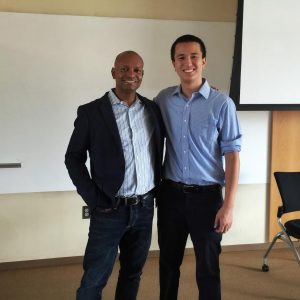Jack Zhang Defends His PhD

Hopkins alumnus Jie (Jack) Zhang successfully defended his PhD thesis in Electrical Engineering in July. Zhang, who earned his bachelor’s degree in Electrical Engineering at Hopkins in 2010, is now at the Massachusetts Institute of Technology (MIT) pursuing postdoctoral studies in neuroscience and electrical engineering. Zhang cites his flexible and creative undergraduate experience as a compelling impetus for his success in research as a graduate student.
He said he was impressed with the flexibility of Hopkins’ undergraduate program, which offered him the freedom to explore many areas of interest. He particularly liked the engineering program’s “very customizable curriculum,” with its few required courses and ability to allow students various routes to fulfilling their degree requirements.
“I think the most valuable experience was my undergraduate research experience. I was able to try out and explore many topics ranging from image processing to computational neuroscience to hardware design. It allowed me to see where my interests lie and put me in a better position for a future career in research,” Zhang said.
During his junior and senior years at Hopkins, Zhang conducted research under the mentorship of Ralph Etienne-Cummings, professor of Electrical and Computer Engineering. The summer of his junior year, Zhang worked as a systems engineering intern for GE Healthcare. In graduate school, he served as a teaching assistant for several courses, including the FPGA synthesis lab, the electronic design lab, and computer architecture.
It was, in fact, those undergraduate experiences working with inspiring and experience instructors that motivated Zhang to return to Hopkins to earn his PhD. In particular, he enjoyed his undergraduate work with Robert E. Jenkins, a senior lecturer in the Department of Electrical and Computer Engineering. Jenkins taught the FPGA synthesis lab during Zhang’s undergraduate years, and introduced Zhang to the field of neuromorphic engineering.
As a PhD student under Etienne-Cummings’ mentorship, Zhang became an International Scholar with the Ultra-Low Power–Biomedical Circuit group at IMEC, Belgium, from October 2011 to July 2012. At IMEC, Zhang gained solid training in circuit design skills and worked with the field’s top researchers and engineers, with whom he built long-lasting partnerships. After his year in Belgium, he continued to work with many of them closely to generate further results and publications, which he believes was “tremendously helpful” for his PhD.
Zhang’s graduate research focused on developing integrated circuits and systems for neural interface and novel image sensor architecture. He also incorporated concepts from machine learning and signal processing into the hardware to improve performance and effectiveness.
For his PhD dissertation, Zhang’s project addressed a fundamental challenge in neural hardware: how can we record from different areas of the brain using very low power and small electronics? To solve this problem, he developed two systems.
The first was a power-efficient neural recording chip built using CMOS technology.
“My system incorporated novel ideas from compressed sensing, machine learning, and sparse representation to compress and extract signal features on a chip. This system drastically reduces system power consumption, which is a limiting factor for large-scale neural interface. I demonstrated that this system can be scaled to build neural interfaces that contain thousands of electrodes,” Zhang said.
The second system was a wireless computational CMOS image sensor with a flexible pixel-wise exposure control.
“In this design, every pixel’s exposure time can be easily controlled to achieve the optimal performance and trade-offs. Using coded exposure patterns, I showed that this sensor can extract high dynamic range (HDR) images from a single snapshot. It can also improve motion blur and image signal to noise ratio (SNR) while simultaneously lowering power consumption. The system has an on-chip ultra-wide band (UWB) radio to transmit video wirelessly,” Zhang said.
He plans to either use this sensor to build miniature microscopes or to mount it on small insects for surveillance applications.
For Zhang, the most rewarding part of the PhD candidate process was learning how to effectively conduct research, from finding the initial idea and proposing a solution, to collaborating with others and implementing and testing designs, to publishing final results.
He admits the process was often challenging. For instance, Zhang would spend months making a circuit, only to discover once it was delivered that it contained mistakes. Then it was more waiting, while the company manufactured a new one.
That painstaking and detailed process taught Zhang some valuable lessons. He learned to be extremely meticulous in his work, and to develop his own methods of validation, so as to avoid making such errors in the design. Even before defending his PhD thesis, Zhang was offered opportunities to work on mobile camera systems and image sensors with several Silicon Valley companies.
At MIT, Zhang is working as a post-doctoral associate at the Picower Institute for Learning and Memory. He is exploring the field of neuroscience and building new tools that enable neuroscientists to record and interact with neurons from different parts of the brain. He also plans to investigate the computational model of place cells in the hippocampus and to work with collaborators at Boston University and the Draper Lab to build novel computation imaging sensors and hardware.


